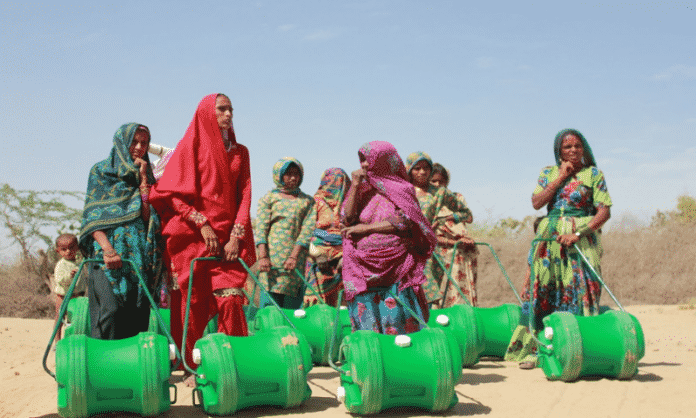The duo distributed a total of 2000 H2O (Help 2 Others) Water Wheels to over 14,000 people belonging to different regions of Sindh and Punjab facing severe water scarcity.
Water Scarcity – How Bad is it for Pakistan?
The World Economic Forum has identified water crisis as the most crucial long-term threat to humankind that will have catastrophic consequences on society in future. For Pakistan, water resources serve as a primary life line. Ever since its existence, the country has constantly been subjected to a wearisome water crisis, and is now slowly proceeding from a “water stressed” country to a “water scarce” country.
Besides this, 48% of the country’s GDP relies on agriculture which requires an immense amount of water usage. Also, the global climate change ultimately affecting Pakistan too, will lead to higher demand of water for crops in near future.
In short, the three major factors hitting water crisis in Pakistan to its very core are climate change, agricultural growth, and overpopulation. According to the International Monetary Fund (IMF), Pakistan is expected to run completely dry and barren by 2025 if immediate steps are not taken to preserve water in time.
The Miseries of Pakistani Rural Areas
Rural areas of Pakistan suffer greater troubles in terms of clean water supply than urban areas. Some reside on drylands where access to clean water is next to impossible. These areas can hardly store water for themselves since there are no reservoirs or storage systems around.
The common practice of the rural people in such areas is to draw water from wells situated at far places and fetch them all the way back to their houses in clay pots. The clay pots hardly carry 2 to 3 liters of water and are never enough to last a day, leading to several tedious trips towards the wells. Hundreds of women spend all their weekdays only in fetching water from the well to their living spaces.
Water Wheel Project – The Ultimate Savior
Seeing to the situation, Tayaba Organization designed a special H2O wheel – a simple yet effective water-carrying device that helps transport and store water safely and can serve to be super-efficient in the arid areas of Pakistan. The device consists of a large drum having a capacity of 40 liters, which can easily be rolled around with a handle using bare minimum force, making it extremely user friendly.
In this good cause, Bayer Pakistan came forward in support of Tayaba Org. to help distribute 2,000 water wheels to the communities suffering from water shortage in Sindh and Punjab. On December 15, a ceremony was held in HasilPur to mark the distribution ceremony of the Water Wheel Project. Under the banner of this project, 1,000 Water Wheels were distributed in Sindh (Umerkot and Tharparkar) and 1,000 in Punjab (HasilPur), to communities identified based on need.
Bayer Pakistan and Tayaba Organization targeted such water-scarce communities of Sindh and Punjab where life means survival – where each member of the family is forced into the struggles of meeting both ends meet every single day – where women and children too are required to join strength with their fellow men in order to provide for their families and fulfil their basic needs like food and water – and where such laborious lifestyle is equivalent to sacrifice of time which could be efficiently utilized in education, innovation, and well-being of the society.
Therefore, the project singlehandedly targets and aids in solving a number of rural area problems. It not only ensures safe and easy transportation of water, but also guarantees a hygienic way of storing water for long term use. What’s more intriguing about this project is that since the Water Wheel is a gender-neutral transportation method encouraging male engagement in the process as well, the project sets a standard in redefining gender roles by breaking the cliché ideology that fetching water is merely a “woman’s job”; a common perception in the rural areas.
The Bayer-funded project directly benefits 14,000 people and many more indirectly, and aligns with United Nations Sustainable Development Goals (UN SDGs) including Goal 5 (Gender Equality), and Goal 6 (Clean Water and Sanitation). It is believed that such projects will help rural communities unburden from unnecessary labor and help them focus on their economic well-being.


